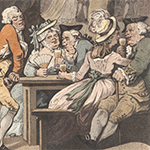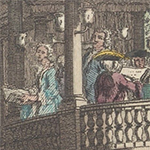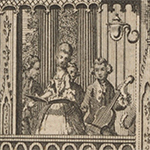Vauxhall Gardens
Names
- Vauxhall Gardens
- Vauxhall Spring Garden
- Vauxhall Pleasure Gardens
- The New Spring Gardens
- Foxhall
Street/Area/District
- Vauxhall Gardens
Maps & Views
- 1741–5 London, Westminster, Southwark & 10 miles round (Rocque): Vauxhall Spring Garden
- 1746 London, Westminster & Southwark (Rocque): Vaux Hall Spring Garden
- 1799 London (Horwood): Vauxhall Gardens
Descriptions
from the Grub Street Project (2005–present)
See alsoVauxhall Gardens, by Paul Rice.
from London Past and Present: Its History, Associations, and Traditions, by Henry Benjamin Wheatley and Peter Cunningham (1891)
Vauxhall Gardens, on the Surrey side of the Thames, and a short distance east of Vauxhall Bridge, over against Millbank, a place of public resort from the reign of Charles II. almost to the present time, and celebrated for its walks, lit with thousands of lamps; its musical and other performances its suppers, including ham cut in wafery slices, and its fireworks. The Gardens were formed circ. 1661, and originally called "The New Spring Gardens," to distinguish them from the Old Spring Gardens at Charing Cross.
Not much unlike what His Majesty has already begun by the wall from Old Spring Gardens to St. James's in that Park, and is somewhat resembled in the New Spring Garden at Lambeth.—Evelyn's Fumifugium, 1661.
July 2, 1661. I went to see the New Spring Garden at Lambeth, a pretty contrived plantation.—Evelyn.
Balthazar Monconys, in his Voyage d'Angleterre, 1633, describes the Jardins Printemps at Lambeth as having "lawns and gravel walks, dividing squares of 20 or 30 yards enclosed with hedges of gooseberry trees, within which were planted roses" and other flowers and shrubs.
June 20, 1665.—Thanksgiving Day for victory over the Dutch. ... By water to Fox Hall [Vauxhall], and there walked an hour alone, observing the several humours of the citizens that were there this holyday, pulling off cherries, and God knows what.—Pepys.
May 28, 1667.—I by water to Foxhall and there walked in Spring Garden. A great deal of company, and the weather and garden pleasant, and it is very pleasant and cheap going thither, for a man may go to spend what he will, or nothing, all is one. But to hear the nightingale and other birds, and other fiddles and there a harp, and here a Jew's trump, and here laughing and there fine people walking is mighty divertising.—Pepys.
May 30, 1668.—Over to Fox Hall, and there fell into the company of Harry Killigrew, a rogue newly come back out of France, but still in disgrace at our Court, and young Newport and others, as very rogues as any in the town, who were ready to take hold of every woman that come by them. And so to supper in an arbour: but Lord! their mad talk did make my heart ake.—Pepys.
Pepys moralises as he makes the entry in his Journal, "But Lord! what loose company was this, that I was in to-night, though full of wit; and worth a man's being in for once, to know the nature of it, and their manner of talk and lives." And then he went again, the next day but one (the next day was "the Lord's Day," so he could not go then), to learn a little more of the nature of it.
June I, 1668.—Alone to Fox Hall, and walked and saw young Newport and two more rogues of the town seize on two ladies, who walked with them an hour with their masks on (perhaps civil ladies); and there I left them.—Pepys.
July 27, 1668.—Over the water with my wife and Deb and Mercer to Spring Garden, and there eat and walked; and observe how rude some of the young gallants of the town are become, to go into people's arbors where there are not men, and almost force the women; which troubled me, to see the confidence of the vice of the age: and so we away by water with much pleasure home.—Pepys.
Hippolita. Not suffered to see a play in a twelvemonth!—
Prue. Nor go to Punchinello, nor Paradise!—
Hippolita. Nor to take a ramble to the Park nor Mulberry Garden!—
Prue. Nor to Totnam Court, nor Islington!—
Hippolita. Nor to eat a syllabub in New Spring Garden with cousin!—Wycherley, The Gentleman Dancing Master, 4to, 1673.
Cunningham. No, Madam, you conquer like the King of France. Your subjects for ever after are at rest.
Thisbe. You said as much to the flam -coloured Petticoat in New Spring Garden.—Sedley, Bellamira, 4to, 1687.
Mrs. Frail. A great piece of business to go to Covent Garden Square in a hackney-coach, and take a turn with one's friend! If I had gone to Knightsbridge, or to Chelsea, or to Spring Garden or to Barn Elms, with a man alone, something might have been said.—Congreve, Love for Love, 4to, 1695.
Lady Fancyful. Tis infallibly some intrigue that brings them to Spring Garden.—Vanbrugh, The Provoked Wife, 4to, 1697.
Wycherley has other references besides that we have quoted. Vanbrugh lays one of his liveliest scenes in the Spring Garden; Etherege, in his She Would if She Could; and other dramatists speak of Foxhall or Spring Gardens in passages indicating with sufficient plainness the character of the place.
The Great Spring Garden, commonly called the New Spring Garden at Fox Hall, with several acres of Land, and Houses, is to be sold. Inquire of Mrs. Eliz. Plant at Fox Hall near the Garden.—London Gazette, No. 3006, p. 1694.
The ladies that have an inclination to be private take delight in the close walks of Spring Gardens, where both sexes meet, and mutually serve one another as guides to lose their way, and the windings and turnings in the little Wildernesses are so intricate, that the most experienced mothers have often lost themselves in looking for their daughters.—Tom Brown's Amusements, 8vo, 1700, p. 54.
May 17, 1711.—I was this evening with Lady Kerry and Miss Pratt at Vauxhall to hear the nightingales, but they are almost past singing.—Swift to Stella.
May 24, 1714.—We went by water to Fox Hall and the Spring Garden. I was surprised with so many pleasant walks, etc., so near London.—Thoresby's Diary, vol. ii. p. 215.
I immediately recollected that it was my good friend Sir Roger's voice, and that I had promised to go with him on the water to Spring Garden, in case it proved a good evening. ... We were now arrived at Spring Garden, which is exquisitely pleasant at this time of the year. When I considered the fragrancy of the walks and bowers, with the choirs of birds that sung upon the trees, and the loose tribe of people that walked under their shades, I could not but look on the place as a kind of Mahometan Paradise. Sir Roger told me it put him in mind of a little coppice by his house in the country, which his chaplain used to call an Aviary of Nightingales. ... He here fetched a deep sigh, and was falling into a fit of musing, when a Mask who came behind him, gave him a gentle tap on the shoulder, and asked him if he would drink a bottle of Mead with her? But the Knight being startled at so unexpected a familiarity, and displeased to be interrupted in his thoughts of the widow, told her "she was a wanton baggage," and bid her go about her business. We concluded our walk with a glass of Burton ale and a slice of hung beef.—The Spectator, No. 383.
We hear very little of New Spring Gardens between 1712 and the great period of their reopening, under the management of Jonathan Tyers, on June 7, 1732, with an entertainment called Ridotto alfresco, at which the Prince of Wales was present, two-thirds of the company appearing in masks, dominoes, or lawyers' gowns. Admission tickets were charged a guinea each. Tyers was unceasing in his endeavours to enlarge the beauty and attractions of the grounds. Hogarth executed several pictures for the rooms, and Tyers presented him with a gold admission medal for himself and friends, bearing the inscription, In perpetuam Beneficii Memoriam. Roubiliac's first work in England was a statue of Handel made for Vauxhall Gardens. Roubiliac is said to have owed his introduction to his first patron, Sir Edward Walpole, to an advertisement he put forth of his having found, on his way home from Vauxhall, a pocket-book containing a considerable number of banknotes, and some papers, apparently of consequence to the owner; their owner was Sir Edward Walpole. The price of admission was 1s. up to the summer of 1792, when it was raised to 2s. Subsequently it was raised to 4s., but in 1850 it was 1s. again. Vocal music was introduced for the first time by Mr. Tyers in 1745. Fireworks were not exhibited till 1798, and even then not constantly displayed.
The coaches being come to the water-side, they all alighted, and getting into one boat, proceeded to Vauxhall. The extreme beauty and elegance of this place is well known to almost every one of my readers; and happy is it for me that it is so; since to give an adequate idea of it would exceed my power of description.—Fielding, Amelia, B. ix. chap. ix.
Tom Tyers was the son of Mr. Jonathan Tyers, the founder of that excellent place of public amusement, Vauxhall Gardens, which must ever be an estate to its proprietor, as it is peculiarly adapted to the taste of the English nation; there being a mixture of curious show, gay exhibition, musick, vocal and instrumental, not too refined for the general ear, for all which only a shilling is paid, and though last not least, good eating and drinking for those who choose to purchase that regale.—Boswell, by Croker, p. 599.
Friday, April 21, 1749, was performed at Vauxhall Gardens the rehearsal of the music for the fireworks, by a band of 100 musicians, to an audience of above 12,000 persons (tickets 2s. 6d. ) So great a resort occasioned such a stoppage on London Bridge [then the only bridge over the Thames below Kingston], that no carriage could pass for three hours. The footmen were so numerous as to obstruct the passage, so that a scuffle happened, in which some gentlemen were wounded.—Gent. Mag., 1749, vol. xix. p. 185.
June 23, 1750.—I had a card from Lady Caroline Petersham to go with her to Vauxhall. I went accordingly to her house and found her and the little Ashe, or the Pollard Ashe as they call her; they had just finished their last layer of red, and looked as handsome as crimson could make them. ... We marched to our barge, with a boat of French horns attending and little Ashe singing. We paraded some time up the river, and at last debarked at Vauxhall. ... Here we picked up Lord Granby, arrived very drunk from Jenny's Whim. ... At last we assembled in our booth, Lady Caroline in the front, with the vizor of her hat erect, and looking gloriously jolly and handsome. She had fetched my brother Orford from the next box, where he was enjoying himself with his petite partie, to help us to mince chickens. We minced seven chickens into a China dish, which Lady Caroline stewed over a lamp with three pats of butter and a flagon of water, stirring and rattling and laughing, and we every minute expecting the dish to fly about our ears. She had brought Betty the fruit-girl, with hampers of strawberries and cherries from Rogers's, and made her wait upon us, and then made her sup by us at a little table. ... In short, the whole air of our party was sufficient, as you will easily imagine, to take up the whole attention of the Garden; so much so, that from 11 o'clock till half an hour after 1 we had the whole concourse round our booth; att last, they came into the little gardens of each booth on the sides of ours, till Harry Vane took up a bumper and drank their healths, and was proceeding to treat them with still greater freedoms. It was 3 o'clock before we got home.—Waipole to Montague, vol. ii. p. 211–214.
This [Foxhall] is the place where are those called Spring Gardens, laid out in so grand a taste, that they are frequented in the three summer months by most of the nobility and gentry, then in and near London; and are often honoured with some of the royal family, who are here entertained with the sweet song of numbers of nightingales, in concert with the best band of musick in England. Here are fine pavilions, shady groves, and most delightful walks, illuminated by above 1000 lamps, so disposed that they all take fire together, almost as quick as lightning, and dart such a sudden blaze as is perfectly surprising. Here are among others, 2 curious statues of Apollo the god, and Mr. Handel the master of musick; and in the centre of the area, where the walks terminate, is erected the temple for the musicians, which is encompassed all round with handsome seats, decorated with pleasant paintings, on subjects most happily adapted to the season, place, and company.—England's Gazetteer, 12mo, 1751 (art. "Foxhall").
There oft returning from the green retreats
Where fair Vauxhallia decks her sylvan seats;
Where each spruce nymph from city Counters free,
Sips the frothed syllabub, or fragrant tea;
While with sliced ham, scraped beef, and burnt champagne,
Her prentice lover soothes his amorous pain.Canning's Loves of the Triangles, 1798.
The title Spring Garden was retained till 1785, when it was changed to Vauxhall Gardens; but the annual licence was to the last taken out in the name of the Spring Gardens. The gardens continued to be a place of fashionable amusement nearly to the end of the reign of George III.; and after they ceased to be fashionable they were long a popular resort. In their later years they were a favourite place for balloon ascents. M. Garnerin ascended several times from these gardens, and on one occasion, September 21, 1802, he descended from a great height in a parachute. It was at Vauxhall that Green became famous as an aeronaut. His voyage to the continent, with Messrs. Monck Mason and Holland, was made in his great balloon, 80 feet high, from Vauxhall, at half-past one in the afternoon of November 7, 1836, and the descent near Weilburg in Nassau about half-past seven next morning. After many changes of managers and fluctuations in prosperity Vauxhall Gardens were opened for the last time on the night of Monday, July 25, 1859. Then, as the advertisements ran, "Farewell to Vauxhall. The last night for ever! ... The last Dancing! the last Suppers! the last Punch! And no extra charge!" Soon after the closing of the gardens the site was laid out in streets, and the whole is now covered with houses, schools, and a church (St. Peter's) designed by J.L. Pearson, architect. The memory of the gardens is preserved in Vauxhall Walk, Tyer Street, etc. There is a capital old view of the gardens by J. Müller, after Wall, and another by S. Maurer, dated 1744; but the best of all is "A general Prospect of Vauxhall Gardens, showing at one view the disposition of the whole Gardens," engraved for the 1754 edition of Stow. Later views abound.


